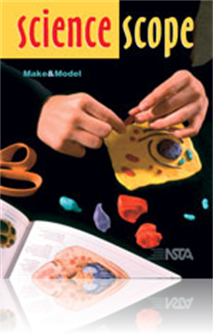All Resources
Journal Article
Science Sampler: Playing games
Playing games in class is always a welcome change, but designing science games can be very time consuming for the teacher. This article describes how to enlist student help in creating new games. Examples and a grading rubric are included....
Journal Article
Science 101: What Is a Watershed?
The term watershed is often used today, but not all of us know what it truly describes. A watershed is an area of land in which all water drains to a common location or waterway. In some parts of a watershed, water flows. In other parts of a watershe...
Journal Article
Editor's Corner: A Vocal Inquiry
The Science Teacher’s editor shares thoughts on the current issue and elaborates on the definition of "inquiry."...
Journal Article
After the Bell: Historical societies—more than a visit to a dusty attic!
The local historical society has a wealth of possibilities. This article features a few ideas on ways they can be used to enhance science curriculum....
Journal Article
The “soda in the aquarium” demonstration will help teachers assess students’ understanding of density and their ability to apply the processes of science. This activity allows students to focus their questions and determine the investigation wh...
Journal Article
Careers in Science: An Interview with Food Technologist Kristen Girard
This column shares interviews with professionals using science in the workplace. The exciting field of food technology is featured in this month's interview with Kristen Girard....
Journal Article
Symbiosis is best defined as a physical association between, or among, organisms of different species that persists for most of their life history. The existence of symbiosis as an evolutionary force teaches students about the history and nature of s...
Journal Article
Ah, springtime! Here in the Heartland we experience a rainbow of color from the buds and blossoms and languish in the warm air. It’s appropriate that this April issue of Science and Children focuses on outdoor adventures with children. It is often ...
Journal Article
The continual student interaction involved in cooperative learning helps students gain a better comprehension of concepts and cultivate their capacity for scientific inquiry. When activities revolve around learning groups, students communicate about ...
Journal Article
Teachers in a multiage classroom integrated science, mathematics, and social studies through exploring their own neighborhood. Following lessons on shapes and materials, a model of a neighborhood was constructed....
Journal Article
Teaching through Trade: Life-Cycle Science
The lifecycle of the butterfly is commonly taught at the elementary level. This month's column focuses on the book Waiting for Wings. Background information and activities for grades K-3 and 4-6 are included....
Journal Article
What Would It Be Like Without...? Examining nonrenewable resources through inquiry-based activities
An educator's role is to provide opportunities to help students explore the topic of renewable and nonrenewable resources and the possible consequences of exploitation. These inquiry-based activities challenge students to reconsider consequences of ...
Journal Article
A program developed by a zoo and elementary school provided nature experiences for urban youth by focusing on habitats and animal adaptations. Zoo educators visited the classroom, teachers continued the lessons with books, and then students visited t...
Journal Article
Connecting Biotechnology and Society
A recombinant DNA activity allows students to consider the benefits and costs of genetic engineering. Laboratory activities in biotechnology can be adapted to provide unique opportunities for students to explore socio-cultural issues in the science c...
Journal Article
Learning Together: Understanding and appreciating students' cultural backgrounds
Understanding and appreciating students’ cultural backgrounds facilitate learning in a Department of Defense (DoD) science classroom. Diversity in the science classroom is both a challenge and an opportunity—a challenge to meet the needs of these...






